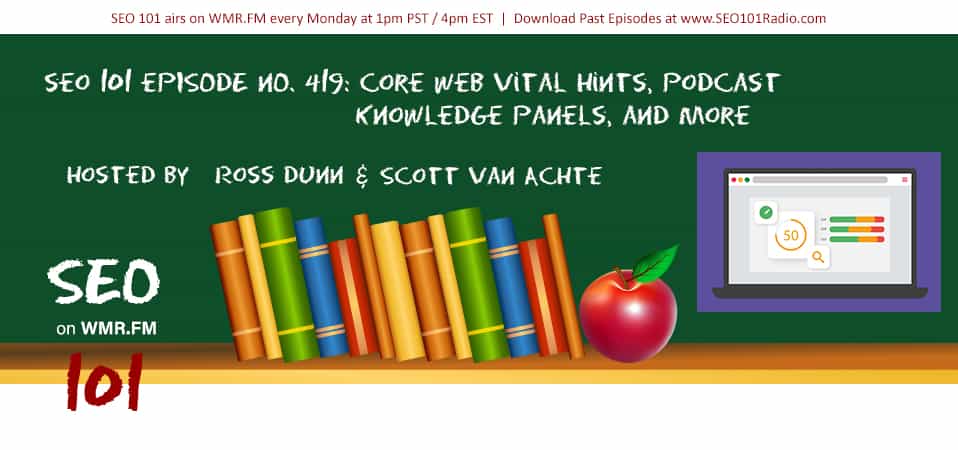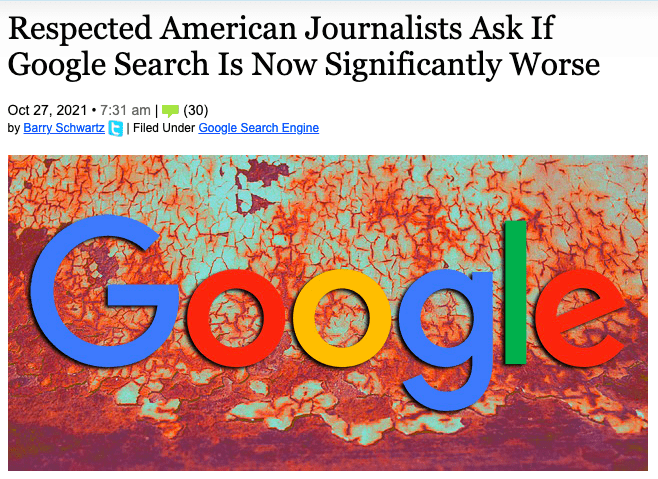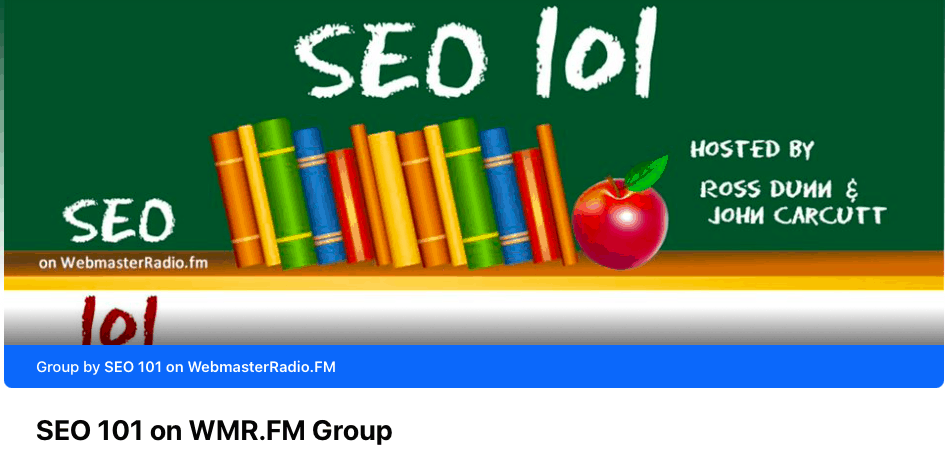Working to improve Core Web Vitals (CWV) can be very frustrating, the gents discuss some new priority hints provided by Google, along with a recent rollout of knowledge panels for podcasts. They also cover a public discussion by respected journalists disparaging Google that gained the eyes and ears of Google’s Danny Sullivan. John Mueller responds to concerns that continuous search results may prove problematic for Google Search Console data, and Ross and Scott respond to questions from listeners.
Noteworthy links from this episode:
- Google Ads Earnings Up Over 40%
- Google’s Priority Hints Improves CWV
- Respected American Journalists Ask If Google Search Is Now Significantly Worse
- Google’s podcast knowledge panel update: Your questions answered
- Google makes it easier to remove images of kids from the search results
Transcription of Episode 419
Ross: Hello, and welcome to SEO 101 on WMR.FM episode number 419. This is Ross Dunn, CEO of StepForth Web Marketing and my co-host is my company’s senior SEO, Scott Van Achte.
We put together a bit of an interesting show today, it’s a slightly shorter one but there’s a fair bit of news out there, isn’t it?
Scott: You know, there’s always something to talk about. It may not be a huge core update week but there’s always something.
Ross: There is. The first one, we’re going to enjoy a little bit. By the time everyone listens to this, Facebook will have already released their new name so we’re just going to have fun. I think it’s tomorrow that they’re actually doing it, based on when we’re recording. We’re gonna put some names out there that they’re not likely to pick, but they’re still fun. I’m going to go with one of my favorites, definitely Metahead. Apparently, it’s something to do with the metaverse, right?
Scott: They’re all into the metaverse, that’s Zuckerberg’s vision.
Ross: Yeah. So there’s Metaface, Metabook, Metafook because why not?
Scott: Why not?
Ross: What was yours?
Scott: What do we have here, Zuckerbook, AlphaMet, you know, trying to poke Google here a little bit. I think maybe, and this was the last one I thought of, it might be my personal favorite – Facebook’s aging population of users. Kids aren’t using it as much. It’s all the baby boomers and like, my grandma (well, I shouldn’t say that because my grandma passed away a long time ago but maybe she’s still using it. Who knows?). It’s the older population so I feel like an appropriate name might be FaceLiftBook would be good.
Ross: So True.
Scott: There we go.
Ross: I think we got some winners there. It’s funny, I tried to look for a synonym or something for Metaverse to see if they’d work with that. Well, apparently, dictionaries can’t keep up with our trendiness because Metaverse is not a word.
Scott: I guess it will be soon.
Ross: Either that or it just broke the computer when I asked for a synonym.
Scott: I don’t know. I was thinking about Metaverse, I’ve heard the term thrown out there but I never really knew what the reference was. I can’t remember the author’s name when it was first used. I didn’t realize that Metaverse is basically a place where people go to escape from a dystopian world. That’s kind of scary, that’s kind of what Facebook has become. When people aren’t happy in their lives, they go to Facebook. I’m not sure how healthy that is.
Ross: I’ve noticed it’s just making it worse.
Scott: Yeah, I know. I’ve cut out my Facebook time.
Ross: Oh dear. Well, on to the next bit here. It should be interesting to see what they come up with. They’re definitely facing some problems, especially with the latest whistleblower.
Scott: Oh, yes.
Ross: The Facebook papers – they’re calling it. Unfortunately, not much is surprised that they’re evil but I think it’s gonna be some serious damage to their user base.
Scott: I think it’s just largely smoke and mirrors to try and hide their evil doings a little bit. I don’t know. We’ll see, I guess.
Ross: Yeah, and they’re trying to break things up a bit before they’re legally broken up. Just like Google did.
Alright, so Google ads – there are some changes there, just a quick piece on that.
Scott: We don’t talk a lot about Google ads, which is why this is under non-SEO news. Their Google ad revenue is way up for Quarter 3 compared to last year. I think the numbers that were released on October 26, showed that for Quarter 3, 2020, they had 37.1 billion in ad earnings through the Google network and Google advertising. This year, it is 53.1 billion, with an increase of 40%. That sounds like an awful lot to me.
Ross: Obviously, I would say a big chunk of that is coming from COVID and all these businesses getting some extra money or using some of their money to try and drive more business. I wonder if Google has had anything to do with COVID.
Scott: You know what, I think they’re in there with Bill Gates. They planned the whole thing, them and the Illuminati. It’s just all part of it *laughs*
I think you’re definitely right, though. I feel like the pandemic has to be a big part of that 40% increase because you have all these new businesses that are online or they’ve been online and they’ve created their e-commerce platforms and their presence and now they need to get the word out, and they need to get it out fast. Organic SEO is great but it’s not as fast as Pay Per Click, right? So, I think the pandemic has a lot to do with it. I wouldn’t be surprised if we saw Quarter 3 next year with a decrease from this year and have people freak out about it. Even though it would be a natural decrease if it happened.
Ross: Yeah, and it won’t be much, if one. I think because there’s so many more businesses online, they’re gonna do well. Certainly, there’s nothing better about the system, they didn’t change anything as far as I know, other than their interface.
Scott: Oh, they changed things like that all the time just to bug people.
Ross: Alright, next up here, let’s get into some SEO news. Google’s priority hints improve core web vitals. 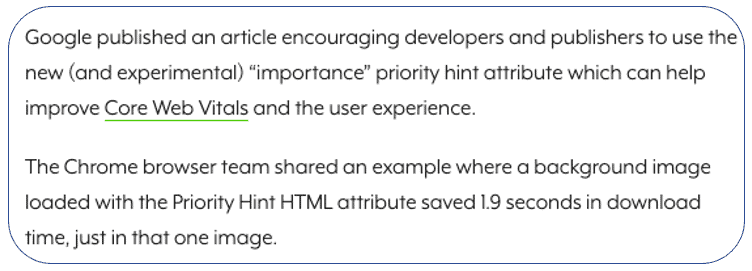
Scott: I use it somewhat often and every time, I get confused about how to pull it up, I don’t know what it is. You go into all this stuff and inspect source and all that kind of stuff then you get in there and I have to dig for it every time, it’s under Performance. It’s there, though. You just gotta look for it.
Ross: It didn’t take long. I use Ctrl+Shift+I on Windows when I’m looking at a page and as soon as I do that, it brings up a console area that you can click on performance data and such, and run core web vitals – all that stuff. Anyway, when you do run it, it’ll give you more data on what it thinks and how things are looking. Ultimately, it’s going to give you some priorities, this is a fairly new initiative. The priority hints are available in the latest chrome editions so if you’re on an older one, it won’t work. There’s a lot to this article and it’s from Search Engine Journal, written by good ol’ Roger Montti. I expected it to be kind of tight and short but I just kept going “whoa, there’s more to this than I thought.” The long and the short of it (I do recommend reading this, if this is of interest to you because the article is significant) is that they’re providing a little more leadership on what needs to be fixed first for the greatest improvements. I think that’s really important. When you’re looking at the classic PageSpeed tool report, they would say which is the biggest image but let’s say, the images weren’t the most important thing to change. It was just being shown in that order no matter what. This is going to give you some more hints. In this article, it even tells you how to enable additional, I believe, experimental features. It’s pretty thorough, so check it out.
Alright. Now, there’s this article that I couldn’t resist adding. It’s from Search Engine Roundtable and the title is “Respected American Journalists Ask if Google Search is Now Significantly Worse.” Of course, the respected American journalist part is really what drove some interest from Danny Sullivan from Google. I’ll never get used to saying that.
Scott: It’s weird.
Ross: It’s very weird. Essentially, some journalists were muttering, the names were Jesse Eisinger, Chris Hayes and Herb Greenberg. Herb Greenberg being the person who they note is a very highly respected American journalist. Jesse Eisinger is an American journalist and author and a winner of the Pulitzer Prize for national reporting. I would say he is definitely the most compelling. Chris Hayes is an American commentator and TV news anchor.
Anyway, Jesse Eisinger said on Twitter, “I saw something about this on Twitter and then just experienced it myself. Have others noticed that Google Search has gotten significantly worse?” Chris Hayes’ response is, “Without a doubt. The recency bias is a killer.” Herb Greenberg dug into the issues with searching for recent news. Anyway, Danny jumped in, he said “if you’re willing to share, I’d love to know what you were seeking and how the results didn’t help. Same for anyone else in this thread.” All in all, what it came down to is Danny felt that they were probably looking for dated content that was being beaten out by more recent content and that’s partly because Google’s trying to drive the most recent information to users to keep it fresh, which has made things a little more difficult for journalists. 
Scott: I can’t say that I entirely disagree with them either. Every now and then, I’ll do a search and it’s like, “What are these results? This is irrelevant.” One good example happened, just as we’re kind of getting ready for this podcast. I was looking for famous radio sign offs to be an example, because I’ve been signing off differently every time and nobody notices or cares. Anyway, I did a search for famous radio sign offs and the first two results were coupon websites. I should have taken a screenshot, I’m sure I could replicate it. Maybe I’ll do that and I’ll post it on Facebook. I’ll totally do it then I’ll send it to Danny and everything. It made no sense to me and then the next two results were articles and it’s funny because they were like news articles, and we’re talking about journalists and they were older articles that were locked behind paywalls. So maybe they’re relevant. I don’t know, I can’t see them. It’s a paywall. But, you know, the first four results were completely useless to me, completely 100% useless and irrelevant. It happened just as we were getting ready for this, so there we go. Google is not perfect, that’s for sure.
Ross: Yeah, no doubt. Usually the comments are useless on these articles. It’s just that they tend to be just biting and nasty but there’s an actual post here that is worth sharing from Michael Lewittes. He says, “I look at news results several hours a day through the lenses of both an SEO and a journalist. Previously, I wrote for or was an editor at a number of news outlets, including but not limited to New York Post, New York Daily News, NBC News, New York Times… To me, the fault lies less with Google than with the publishers themselves. It sometimes seems news outlets put more emphasis on being first over being (more) thorough. Perhaps working at home has also hindered the collaborative nature that’s so integral to journalism. (Certainly, younger reporters are unable to benefit more fully from working side-by-side with seasoned colleagues). It’s also more common these days for outlets to do “bittier” stories with bullet points and “brief takes,” but those articles often come off — comparatively speaking– as thin. Anecdotally, from staring at this day after day, while articles in Top Stories and News undoubtedly shift a bit because of recency, for the most part it’s the more robust and authoritative pieces that rise to and remain at the top of search results.” I thought that was a really insightful response and I wouldn’t disagree. I don’t think he’s ever said it, but John has mentioned that as he works with his newspapers (he is a newspaper SEO), he’s always training them on how to be more catchy- catch the news, catch the readers, and obviously, that’s important. These days, I would imagine they are getting pushed in that direction of creating something that’s really just catching eyes, may not be as meaty as it used to be. Yeah, interesting stuff, way more than we need to spend on that, I know, but occasionally some things like that are really interesting.
Alright, the Google podcast knowledge panel update, that’s a mouthful. 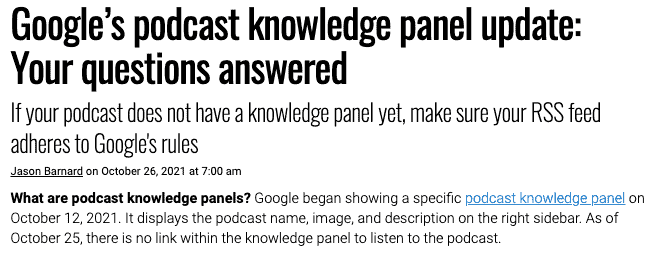
Scott: Like the smell or the bird.
Ross: What was weird to me though, is when I looked at our result, the knowledge panel itself didn’t actually have any of our podcasts. It just had a snippet about it. The search results did though. Now, Jason Barnard, he was mentioning that it’s just rolling out so we’re probably gonna see a lot more meat coming to the actual panel but I would hope that they’re going to have some of the podcasts or players or something built into it so it’s a little more useful. Maybe some pictures of the hosts, pictures of past guests. There’s a lot of stuff they could add to it but it is nice to see. If you have your own podcast and you’re not showing up, apparently, you need to follow some recent rules that Google launched. There are changes in podcasting requirements as of September 21. To quote them, “Google will begin enforcing updated information requirements for all podcasts on the Google podcast platform. A podcast that does not provide the required information cannot appear in Google podcast recommendations. The podcast can still appear in Google and Google Podcasts search results and users can continue to subscribe to it, it just won’t be recommended. If you’re using a podcast hosting provider, you can provide any missing information using your provider’s podcast management pages. If you edit your RSS feed directly, you can provide the information directly in the RSS feed. Here’s a summary of the required changes…” and it gets into it, including a valid crawlable image, etc. Really worth looking into if you do have a podcast and it’s not showing up. Mind you, it’s only 50% that have shown up, that doesn’t mean the others aren’t going to show up soon. Google does tend to do this stuff in waves so we’ll see how that pans out.
Scott: And they definitely tend to change the layout, shortly after launching something new. I think it’s quite likely that in the near future, maybe in the next few days or weeks, at least, we’ll start to see at least a website link or maybe an embed of the most recent episode or something, some more information there other than just the title and description.
Ross: Yeah, so right now, the knowledge panels that have been triggered by the Google podcasts, the update being on October 12, apparently, have not been enriched. That’s what we’re talking about. I’m reading here from the article that Jason wrote. He says “…it’s very early yet. If you create an Entity Home, you can provide additional information above and beyond what’s included in the RSS feed. By providing that information on the Entity Home and getting corroborative information all around the web, you will be able to push additional information into your knowledge panel. I would suggest you start now because even if you can’t enrich it right away, you’ll be able to enrich it over time. So now’s the time to start!” Now, take that and also apply that to your own brand. That is important, you know, what is your entity home? I can’t release the one I’ve got going now but I’m going to, at one point, have an entity home for myself as sort of the place that I’m going to have everything linking to, from a speaker’s perspective, from a consulting perspective. I still have my business site but I want to have a single page, which is me, my brand. That’s something that you should work on, if that’s of interest to you. If it’s your business and let’s say you have individual pages for staff, and you want to create their entities there, then you have to build that out on each of their pages and build links to those pages as the entity for that person. Yeah, it’s a lot of work but that knowledge panel looks damn cool. I think it’s a real authoritative clincher for sales. You can say, “Hey look, here’s my knowledge panel. I’ve been around for a while.” Can’t get this without being around a while and having some authority. So it’s a nice little calling card.
Scott: Absolutely.
Ross: We should take a quick break and when we get back, we’re going to talk about some new improvements to removing images of kids from search results, which I think is a great thing. We’ll be right back.
Welcome back to SEO 101 on WMR.FM. Hosted by myself, Ross Dunn, CEO of StepForth Web Marketing and my company’s senior SEO, Scott Van Achte.
So what is this article? Google makes it easier to remove images of kids from the search results.
Scott: Yeah, this is good. We’ve noticed over the past year that Google has been doing a lot to help people remove stuff that shouldn’t be there, like hate speech and revenge type content. Now, they’re also allowing it or making it significantly easier for anyone under the age of 18 or these kids’ parents or guardians to request removal of their images from Google search results. Once removed, the removal can lead to the image no longer appearing in the Google Images tab or as thumbnails in any feature of Google search, which is great. Of course, it won’t remove images from other websites but at least it’ll help keep that image from Google. It’s a step in the right direction for sure. I’ll give you a couple quick steps here on how to do it. If you find an image of your kids or you are a kid, you’re probably not listening to this podcast if you are but you never know, right? I tried to get my kids to listen to it and they’re like, “What? We don’t care dad,” and then they go on and do whatever they do. Anyway, if you want to get your kids’ images removed from Google, fill out this form. 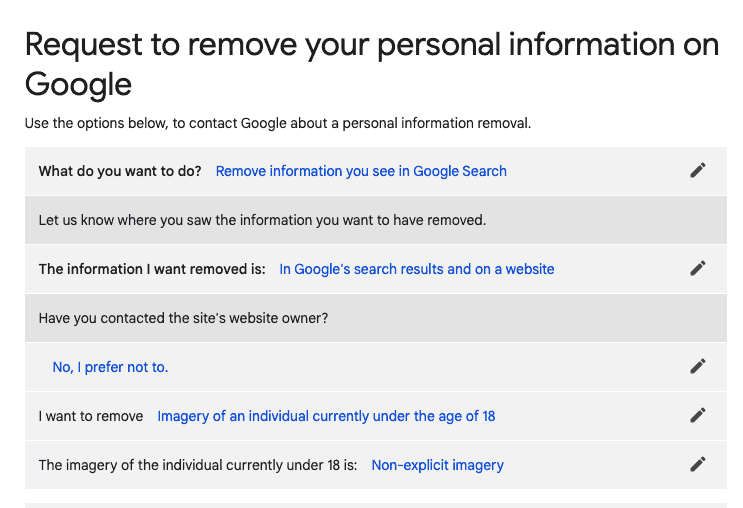
Ross: Alright, very cool. Anything to protect the kids out there is a wonderful thing. It’s probably about time, to say the least.
Scott: Absolutely.
Ross: My kids would probably want to do that for all their older pictures when they were young because I’ve been kind of too brag-ish about them. They’re so cute.
Scott: Oh, I’m sure if my kids could contact Apple and be like, “Can we remove all our pictures from iCloud please? All of them.” When I take a picture of them, they freak out. That’s not going on the internet, just do your thing, let me video it. Don’t delete it off my phone. Stupid kids. What are you gonna do? They’ll regret not having videos of all these crazy things when they’re adults but for now, they don’t like it.
Ross: When you think about it, they’re never gonna forget anything. I’ve forgotten so much of my childhood but they’ll be able to go back and get reminded all the time.
Scott: Oh, all the time, and all the embarrassing stuff for sure. They’ll be reminded of that every time.
Ross: Put emphasis on that, for sure. That’s your job.
So, in the Mueller files, Google’s continuous scroll has no impact on Search Console reports. This is a quickie but essentially, people were concerned that continuous scroll might mess up the data from Search Console reports on ranking positions. John Mueller said, “nothing changes — position is position.” He doesn’t know how third party rank trackers will handle it but they’re outside of the terms and service, anyway. You made a couple notes here.
Scott: Oh, yeah. Like John had said this, that your impressions may increase slightly as well, as people decide to scroll further. If you don’t have to click that button, people might scroll, see a few more pages worth of results, even though you don’t see it as a page. So you might get an increase in impressions and there may be a subtle change in click through rate. Likely, click through rates may drop a little bit as people scroll further. On the flip side, if you’ve got a lower ranking, you might see your click through rate go up because people are actually reaching you. Really, all in all, to the people out there who have concerns about how continuous scroll may affect their data in Search Console, it doesn’t really seem to look like that will be the case but I would love to hear from anybody, if you have seen massive changes since continuous scroll launched, which I believe is only available in the US right now, hit us up on Facebook and we’ll look into that because I’d be super curious to see if that’s the case for anybody.
Ross: Okay, so we’re down to the questions. I think we’ll start off with this observation, I think you put it in here. That’s a really good start.
Scott: Yeah, kind of interesting. So Kamran, who’s actually been fairly active on our Facebook group, which is awesome. I think he’s probably listening because he seems to be listening. So, thanks for this. I think he posted it about a week or two ago. He said that,
“Figured I would share this. Back in May, I learned that it is best to not include date stamps in the slug URL. I made the change without proper planning and saw my blog post de-indexed with Google. Then I spent two weeks patching up my mistake and setting up redirects for all the old URLs, and directed them to new URLs. Then I requested Google to reindex all my newly formatted blog posts. So at the beginning of June, I saw an immense growth in organic impressions and traffic. Definitely a great learning experience and great to see how small changes can really have an impact.”
So, there’s a few things here. One of the reasons I included it as a big takeaways, forget about what happened to his rankings. In the big picture, he made a change, he changed a lot of URLs, I’m assuming it’s a significant number, he didn’t specify how vast of a change this was. But he forgot or didn’t think to set up redirects initially and that resulted in a mass de-indexing of content and loss of traffic and all that kind of stuff. So big takeaway there is don’t forget about redirects. If you’re out there and you’re doing any kind of URL changes, no matter how small they are, get your redirects in place or you’ll be like Kamran and have to rush back and fix it as an afterthought, which he did, and things came back, which is good. What he did is he removed dates out of the slug, so instead of 2020/10/title name of the blog post, he got rid of the 2020/10. After he removed that, his impressions and traffic went up. I’ve never heard, specifically, of that change having that kind of an impact that he describes and he does share a screenshot to Search Console and it looks like impressions, maybe doubled over a span of a couple of weeks, which is fantastic but I do question the timing. He had noted that it was at the beginning of June that he had everything fixed or that’s when he saw the growth. In the screenshot, it looks like it’s a little bit later in June so it’s hard to say but there are some other factors that sort of correlate there. June saw 2 spam updates: the Google algorithm, the page experience updates started rolling out and there was a core update on July 1, which is a bit into that. So there may be other factors which saw his rankings grow. I would love people to comment on his post. If you removed the date portion of a slug URL and saw rankings improve, I would love to hear more about that because I haven’t seen firsthand that change have that kind of impact.
Ross: And any other smaller changes, or seemingly smaller changes you’ve made that had some kind of a ranking impact, positive or negative. It’s always interesting to hear both sides. Yeah. Thank you. Thanks, Kamran for posting that.
Scott: I was quite interested in it because, as you know Ross, we have another client who’s got, I’d say decades (plural) but at least a decade of really good content and it all has that date format in the URL. I would actually like to see that change but of course, changing URLs for 10 years of content is kind of a scary concept and so I want to start looking into this a bit more and see if,…I’d be skeptical to say that this small change would have that big of an impact but it’s definitely something that’s on my radar right now and I want to look into. Again, that’s why I want to see more proof, if you’ve got proof out there. I don’t want to recommend it to my client unless I’m positive or highly confident it will have a good impact for him.
Ross: Yeah, and also, is it the best idea for the net?
Scott: That’s a really good question.
Ross: I mean, if you’re taking old content and making it appear new, if that’s really what you’re doing here. If that is the case, then that could be detrimental to your authority and your reputation too. It depends on what’s being said. It also over saturates Google with garbage, which they may not look kindly on. I don’t know, definitely some serious questions to consider there.
I know we mentioned in the last show that one of our listeners and friends, Michael Linehan, asked us a few questions. Anyway, let’s get to his second one. It says, “About length of pages: There is a lot of varied information on page length… and some is very contradictory on what is best for humans and what might be best for search engines. What is your best knowledge on optimum page length from the points of view of ease of use and of SEO?”
Scott: The answer to this is a simple, commonly hated two-word phrase — it depends.
Ross: A couple of examples that say… Well, first of all, the standard answer is, how long does it need to be to provide the best answer? That’s the way I like to look at it. If you’re providing the absolute best answer that you know of, that would make someone go “Wow, I need to go nowhere else. This is everything I need and I’m even going to share this” Then that’s it, if that’s the length, that’s what you want to have. I think that’s the simplest way to look at it. Don’t think of it from an SEO perspective. You know, once you’ve gotten that done, look at different ways of making it more interesting to users and search. That is: adding multiple types of media, links, embed videos, heck, if it’s about a bird, put an audio of the bird so you can listen to it in the wild. I mean, things like that. The other thing is too: let’s say you’re doing an article on the ins and outs of drone flying – that may be too much for a single article. That’s pretty enormous, right? You may want to break that into separate. If it’s a long, gigantic article, it just might have too many topics and it might be a little more difficult for you to get all the juice out of it. If you broke it down into acrobatics, basics of flying, the nuances of video from a drone, that sort of stuff. There’s so much to it that you could make this almost into a mini book, and create quite a resource on your site. Especially, if you’re a drone flight training school (which these days they have), then this would be a pretty compelling resource to have. Those are my thoughts. What do you think, Scott?
Scott: Yeah, it’s true. The length can be whatever makes sense but what I usually tell clients, when they’re like, “how long does this page need to be?” I know they don’t want to write a single word down and if I tell them 500,000 / 2,000 words, they’re just gonna yell at me. Well, they won’t yell but they won’t do it. They just won’t do it. So, I tend to say, try to get at least 300 to 350 words. It’s not necessarily enough and sometimes it’s more than enough but I feel like it’s a number that doesn’t scare people and they’re more likely to do it.
Ross: And you’re talking about just like a service page or a product page or About page, something that is not an article.
Scott: Absolutely. Sorry, I should clarify that. That’s if you’re trying to enhance a page that already exists. If you’re writing a brand new article from scratch, writing 350 words is not scary because you’re already planning on writing something real. That [suggestion] is more about improving on an existing page. I saw a couple studies, I think it was last week or the week before and you don’t always want to go based on this stuff. The one showed that the average page 1 listing in Google, had on average of 1400 words of text, and the other study showed around 2000 words of text on average. Now, that’s going to vary a lot between industries, you may not have to do that. Again, it comes down to causation versus correlation, right? It doesn’t mean that that length of content created the rankings, it could just be that that type of search phrase just results in content that’s longer. The point is, longer content typically does tend to rank well and it brings up various longtail rankings and other rankings that you might not necessarily be going for. If it’s focused and relevant and well written, you know, I always say longer is better in most cases.
Ross: There you go.
Scott: For a non-answer.
Ross: Yeah. Well, that was good. I mean, and really just focus on quality. That’s my line, and I’m sure Google would love it because it is the case. You just make sure you do a great job and it will pan out. Just compare yourself, like what you’ve written to other content out there and let’s say, you find six months later, you put the same article that you liked then, and you find that there’s just no comparison anymore. Someone’s done an amazing job. Beef it up, put it on your list to be improved again. There’s absolutely nothing wrong with revisiting content and beefing it up. In fact, it’s a really good idea, especially if you’ve already got some traffic and some links to it. It becomes a cornerstone content on your site and that’s a wonderful thing to build and nurture.
Alright, on behalf of myself, Ross Dunn, CEO of StepForth Web Marketing and my company’s senior SEO, Scott Van Achte, thank you for joining us today. If you have any questions you’d like to share with us, please feel free to post them on our Facebook group easily found by searching SEO 101 Podcast on Facebook.
Have a great week and remember to tune in to future episodes, which are every week on WMR.FM.
Scott: And my apologies to Matt Damon, we’ve run out of time and thanks for listening, everyone.
Ross: Jimmy Kimmel!
Scott: You got the reference, alright!
Ross: Take care, all!
Mueller File:
